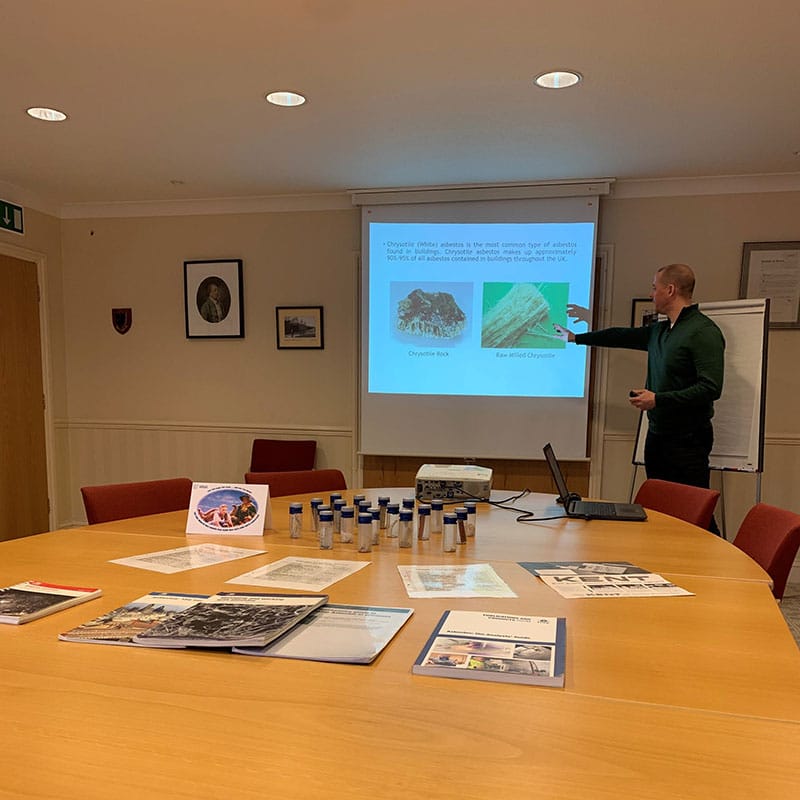Why should your asbestos duty to manage training be UKATA accredited?
The concept of the “duty to manage” asbestos should be familiar to anyone who manages or is responsible for the maintenance and repair of premises where asbestos may be present. It is contained within the stringent asbestos regulation that exists in the UK today, and is instrumental in ensuring the safe and responsible management of asbestos-containing materials (ACMs).
Asbestos duty to manage training plays an integral role in ensuring that “dutyholders” under the Control of Asbestos Regulations 2012 (CAR 2012) are able to comply with their legal duties and keep people safe from coming into contact with the now-notorious carcinogen.
But how can you be sure, in turn, that any asbestos duty to manage training you take advantage of meets the essential quality standards? One answer is to ensure you turn to a training provider that is a member of, and certified by, UKATA.
Understanding asbestos duty to manage training
As the name of this type of training indicates, it is a type of training aimed at individuals who have a “duty to manage” asbestos, in accordance with regulation 4 of CAR 2012, as well as those whose job it is to assist such dutyholders.
So, the likes of building owners, landlords, sub-lessors, dutyholder’s assistants, and appointed person’s assistants, could all potentially benefit from receiving asbestos duty to manage training. Nor is the aforementioned by any means an exhaustive list.
CAR 2012, for those who are unaware, sets out various actions that those with a “duty to manage” asbestos are required to take.
Such actions include – but are not limited to – taking reasonable steps to determine whether there are ACMs in a given premises for which they are the dutyholder, as well as putting together, and keeping up to date, a record of the location and condition of any such materials. They will also need to prepare a plan setting out how the risks from such ACMs will be managed, in addition to taking the necessary steps to put that plan into action.
As a dutyholder or someone with responsibility for assisting a dutyholder, you might not know about the aforementioned broad legislative picture for such individuals.
Asbestos duty to manage training therefore plays a crucial role in ensuring sound asbestos management. It does this by providing the delegate with a basic understanding of the legislative requirements that CAR 2012 sets out.
In the process, this training addresses such matters as who the dutyholder may be, the asbestos surveys available, what can be expected from an asbestos survey, and the role of an asbestos management plan.
The importance of accreditation
If you are considering undergoing asbestos duty to manage training or arranging such training for someone else, you will not want to have to merely hope the training is “good enough” for your requirements.
After all, the “duty to manage” asbestos is a very serious legal obligation; a dutyholder who fails to put in place an asbestos management plan, for example, could be at risk of being fined as much as £20,000, or handed a six-month prison sentence. In the case of serious breaches of the regulations, unlimited fines and/or prison sentences of up to two years are possible.
So, if you can ensure you only obtain your asbestos duty to manage training from a training provider that is accredited by a respected body in the asbestos management industry, this will give you peace of mind and assurance that you will be taking the right steps to help ensure legal compliance.
And when it comes to accredited training, you can’t do better than training from a company that is a member of, and has been accredited by, UKATA. Also known as the United Kingdom Asbestos Training Association, UKATA is an association that the UK Health and Safety Executive (HSE) has recognised as being a reputable source of asbestos training providers.
UKATA: the United Kingdom Asbestos Training Association
UKATA is an association with a membership base made up of asbestos training providers. The organisation was established in 2008, with the remit of setting standards, auditing, and managing a list of asbestos training providers.
Prior to the establishment of UKATA, the HSE had maintained its own list of asbestos training providers, known as the Asbestos Training Providers’ Working Group (ATPWG). The formation of UKATA constituted a natural next step from this; the inaugural UKATA meeting was held in September 2007, with 41 of the 50 training providers on the ATPWG list agreeing to join the new association.
UKATA has gone from strength to strength in the asbestos management industry since then. Its mission statement is to “remain at the forefront of asbestos training and awareness,” with a commitment to “both maintaining and improving higher standards of asbestos training through ongoing monitoring of UKATA-approved training providers.”
UKATA implements various measures to help ensure the high standards of asbestos training providers, including regular inspections, monitoring, and auditing. This helps to ensure those on the lookout for asbestos duty to manage training can have the very greatest confidence when they see that a given training provider is a member of, and accredited by, UKATA.
The advantages of UKATA accredited training
If you insist on only going with a provider of asbestos duty to manage training that holds UKATA accreditation, you will be able to unlock the following benefits:
- An assurance of high-quality training, due to the stringent measures and rules that the association puts in place to ensure standards are upheld
- Compliance with legal requirements; a course being UKATA accredited will mean you can trust it to provide you with an accurate and up-to-date overview of the legal duties you have under CAR 2012
- Recognition and credibility in the industry; UKATA has existed for 15 years, and has been acknowledged for the quality of its work by the HSE. The association enjoys a stellar reputation as the UK’s leading authority on asbestos training
- Tailored training for specific needs; one UKATA member organisation’s asbestos duty to manage training will not necessarily look exactly the same as the training provided by another UKATA member. This is because, while UKATA provides guidance on the minimum content of courses, trainers are otherwise free to tailor the training they provide in accordance with the particular requirements of individual delegates
- Access to the latest industry insights; with UKATA setting out the core content that must be included in every asbestos duty to manage training course that a UKATA member organisation provides, delegates can be assured that the training they undergo will incorporate the most recent developments in asbestos management.
Accredited training vs non-accredited training
You could, of course, opt for non-accredited asbestos duty to manage training – but doing so would present a number of risks, with relatively little upside.
Yes, a given non-accredited course provider may seem to have a good reputation, and it might claim to cover the same essentials of asbestos management as a UKATA-accredited course would. However, in the absence of third-party checks and auditing by a respected external body, you would be forced to, in effect, “take their word for it”.
Even a course provider that has been well-regarded in the industry down the years, could be susceptible to allowing its standards of training to slip, if it is not being held to account by a reputable sector-wide organisation like UKATA. And as we have stated above, if you fall out of line with the legal requirements under CAR 2012 as a result of poor-quality training, the legal, financial, and reputational consequences could be severe.
In short, going with a non-accredited provider of asbestos duty to manage training, would mean taking a risk that you simply do not need to take.
For the peace of mind of knowing your chosen training provider is regularly inspected and checked in line with strict requirements by highly knowledgeable and capable people in the asbestos sector, look no further than UKATA-accredited training.
The UKATA accreditation process
UKATA-accredited training providers are so strongly respected, in large part because there are real consequences if they fail to comply with the association’s stringent criteria; they could even lose their membership and certification status altogether.
There are various measures that UKATA implements in its process of certifying asbestos training providers. These include:
- The verification of course content. UKATA sets out standard core syllabi for the training courses of accredited organisations. The association checks each training provider’s presentation materials, course handouts, and trainers’ narrative to ensure compliance with its requirements
- The checking of individual tutors for competency. In order for a tutor to deliver UKATA-certified asbestos training, they must undergo an audit to determine their professionalism and competence. Among the specific requirements is that they must have three years’ experience in the relevant asbestos field in the last five years
- The checking and verification of training providers’ facilities. The site where training is to be delivered must also satisfy UKATA’s standards in relation to a wide range of aspects, encompassing (but not limited to) physical layout, presentation equipment, and health and safety. Here at Oracle Solutions, for example, we have a bespoke training centre at which we deliver UKATA-certified asbestos training.
Conclusion: knowing a course is UKATA-accredited can greatly enhance peace of mind
We have sought in this guide to make clear the value that UKATA accreditation has – and should have – for dutyholders, and those assisting dutyholders, who are on the lookout for asbestos duty to manage training that they can trust.
Given that complying with the “duty to manage” asbestos in accordance with CAR 2012 is far from an optional extra, but is instead central to ensuring asbestos is managed in a given building in a safe and lawful manner, knowing that a particular training course is UKATA-accredited should give you considerable peace of mind.
Would you like to learn more about Oracle Solutions’ own UKATA-accredited asbestos duty to manage training? If so, please feel free to click through to the relevant page of our website. You are also welcome to reach out to us via phone or email to request a free quote for any of our broad range of industry-leading asbestos services.

Written by Brendan Coleman
Brendan Coleman, with decades of experience in the asbestos industry, is a dedicated Quality Manager. Certified as a surveyor and analyst, he is adept in operations and quality management with a keen focus on HSE compliance. His expertise is pivotal in maintaining high safety and efficiency standards. Brendan ensures our UKAS accreditation requirements are consistently met and exceeded, upholding stringent standards in asbestos remediation. His commitment to enhancing quality and customer satisfaction makes him an essential advisor in asbestos management.

